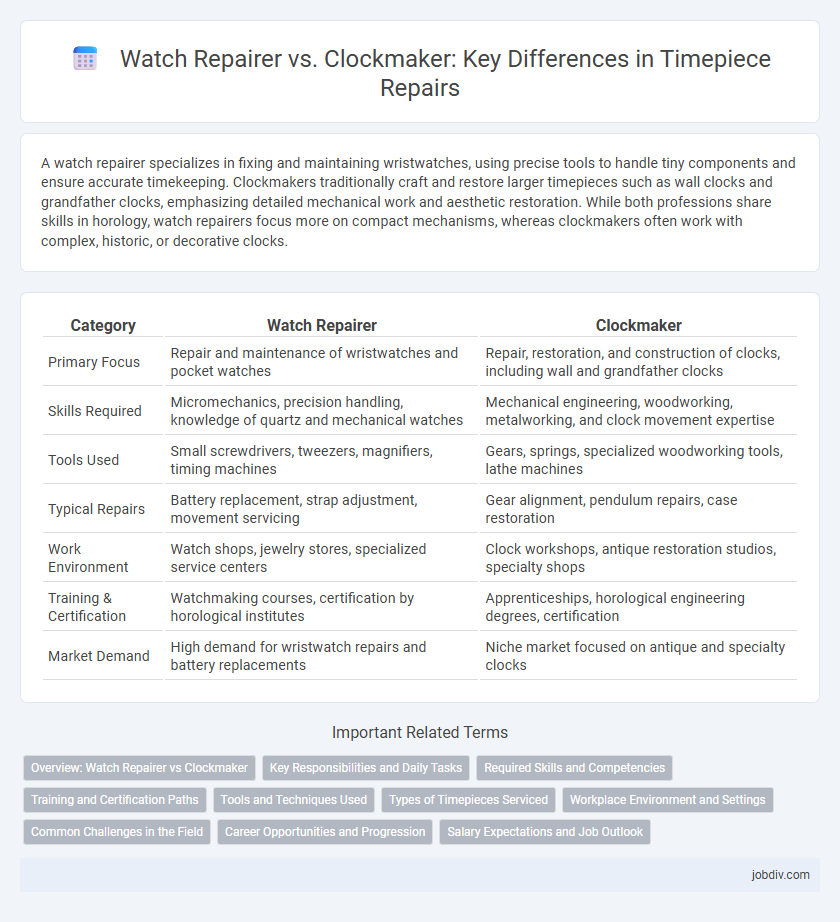A watch repairer specializes in fixing and maintaining wristwatches, using precise tools to handle tiny components and ensure accurate timekeeping. Clockmakers traditionally craft and restore larger timepieces such as wall clocks and grandfather clocks, emphasizing detailed mechanical work and aesthetic restoration. While both professions share skills in horology, watch repairers focus more on compact mechanisms, whereas clockmakers often work with complex, historic, or decorative clocks.
Table of Comparison
| Category | Watch Repairer | Clockmaker |
|---|---|---|
| Primary Focus | Repair and maintenance of wristwatches and pocket watches | Repair, restoration, and construction of clocks, including wall and grandfather clocks |
| Skills Required | Micromechanics, precision handling, knowledge of quartz and mechanical watches | Mechanical engineering, woodworking, metalworking, and clock movement expertise |
| Tools Used | Small screwdrivers, tweezers, magnifiers, timing machines | Gears, springs, specialized woodworking tools, lathe machines |
| Typical Repairs | Battery replacement, strap adjustment, movement servicing | Gear alignment, pendulum repairs, case restoration |
| Work Environment | Watch shops, jewelry stores, specialized service centers | Clock workshops, antique restoration studios, specialty shops |
| Training & Certification | Watchmaking courses, certification by horological institutes | Apprenticeships, horological engineering degrees, certification |
| Market Demand | High demand for wristwatch repairs and battery replacements | Niche market focused on antique and specialty clocks |
Overview: Watch Repairer vs Clockmaker
Watch repairers specialize in maintaining and fixing wristwatches, focusing on intricate mechanisms such as quartz movements and automatic calibers. Clockmakers handle larger timepieces like wall clocks and grandfather clocks, often dealing with mechanical or pendulum-driven systems. Both require precise skills but differ in scale, tools, and specific technical expertise.
Key Responsibilities and Daily Tasks
A watch repairer specializes in maintaining, diagnosing, and fixing intricate timepieces like wristwatches, focusing on battery replacement, gear repairs, and precision calibration. In contrast, a clockmaker works primarily with larger timekeeping devices such as wall clocks or grandfather clocks, handling tasks like mechanical restoration, pendulum adjustments, and case refinishing. Both professions demand expertise in intricate mechanisms, but the scale and complexity of timepieces differ significantly in their daily responsibilities.
Required Skills and Competencies
Watch repairers require precision skills in micro-mechanical adjustments and expertise in handling tiny components, often needing knowledge of electronic systems in modern watches. Clockmakers demonstrate proficiency in traditional mechanical engineering, focusing on larger gears and pendulums, alongside mastery in historical restoration techniques. Both professions demand strong problem-solving abilities, attention to detail, and steady hand-eye coordination to ensure accurate timekeeping repair.
Training and Certification Paths
Watch repairers typically complete specialized watchmaking courses that focus on small, precise components, often earning certifications such as the WOSTEP diploma or CW21 credential. Clockmakers undergo extensive training in horology with an emphasis on larger mechanisms, earning credentials from institutions like the American Clock & Watch Museum or the British Horological Institute. Both professions require hands-on apprenticeships and continuous education to master repair techniques, maintain accuracy, and uphold industry standards.
Tools and Techniques Used
Watch repairers rely on precision tools such as tweezers, screwdrivers, and magnifying lenses to address intricate mechanisms in wristwatches. Clockmakers utilize heavier instruments like gear pullers, mainspring winders, and specialized lubricants tailored for larger timepieces like grandfather clocks. Both professions require skills in disassembly, cleaning, and calibration, but the scale and complexity of tools and techniques differ significantly based on the size and type of the timepiece.
Types of Timepieces Serviced
Watch repairers specialize in servicing various types of wristwatches, including mechanical, quartz, and smartwatches, while clockmakers focus on larger timepieces such as wall clocks, grandfather clocks, and mantel clocks. Watch repair involves intricate work with tiny components like gears, springs, and batteries, whereas clockmaking often requires handling pendulums, weights, and chimes. Both professions demand precision, but the size and complexity of the timepieces served distinguish the two crafts.
Workplace Environment and Settings
Watch repairers typically work in small, well-lit workshops or retail stores equipped with precision tools and magnification devices to handle delicate watch components. Clockmakers often operate in larger, specialized workshops that accommodate bigger clock mechanisms, allowing space for both intricate gear assemblies and substantial case restorations. Both professions require quiet, controlled environments to focus on detailed craftsmanship and ensure accuracy in timepiece repairs.
Common Challenges in the Field
Watch repairers and clockmakers both face challenges such as restoring delicate mechanisms and sourcing rare parts for antique timepieces. Precision in handling intricate gears and maintaining accuracy under microscopic conditions is critical in both professions. Adapting to advancements in technology while preserving traditional craftsmanship remains a common obstacle in the repair industry.
Career Opportunities and Progression
Watch repairers specialize in maintaining and fixing timepieces such as wristwatches and pocket watches, with career opportunities often found in jewelry stores and specialized service centers. Clockmakers focus on crafting and restoring larger timepieces like grandfather clocks and wall clocks, typically working in workshops or antique restoration businesses. Career progression for watch repairers may lead to master watchmaker roles or brand-specific certifications, while clockmakers can advance by gaining expertise in mechanical restoration and custom clock creation.
Salary Expectations and Job Outlook
Watch repairers typically earn a median annual salary of $40,000 to $50,000, with job growth projected at 3% over the next decade due to steady demand for personal timepiece maintenance. Clockmakers, specializing in larger and often antique timepieces, may see salaries ranging from $35,000 to $45,000, but face slower job growth around 1-2%, impacted by fewer clock-specific repair needs. Both professions require specialized skills in precision mechanics, but watch repairers often find more diverse opportunities in jewelry and retail sectors, influencing their slightly higher salary potential and more stable job outlook.
Watch Repairer vs Clockmaker Infographic

 jobdiv.com
jobdiv.com